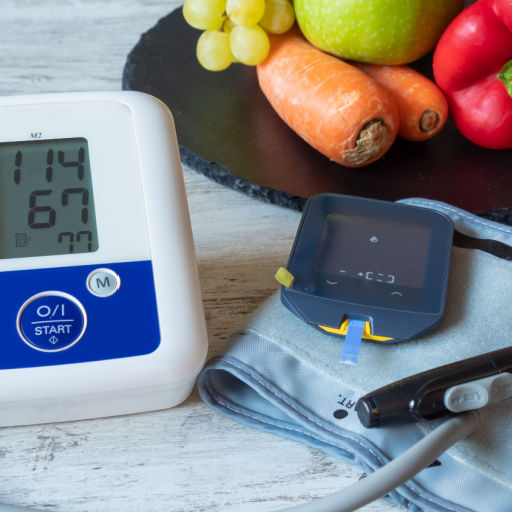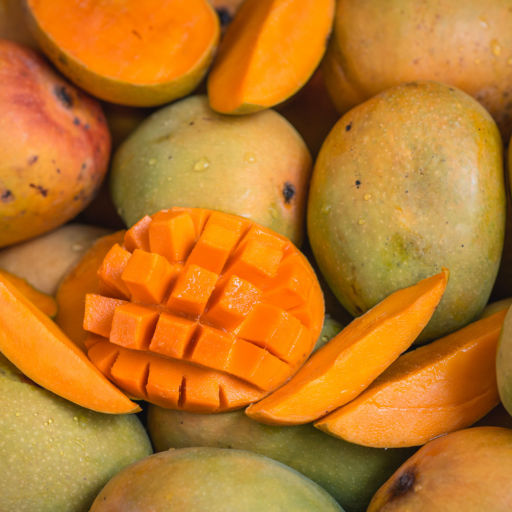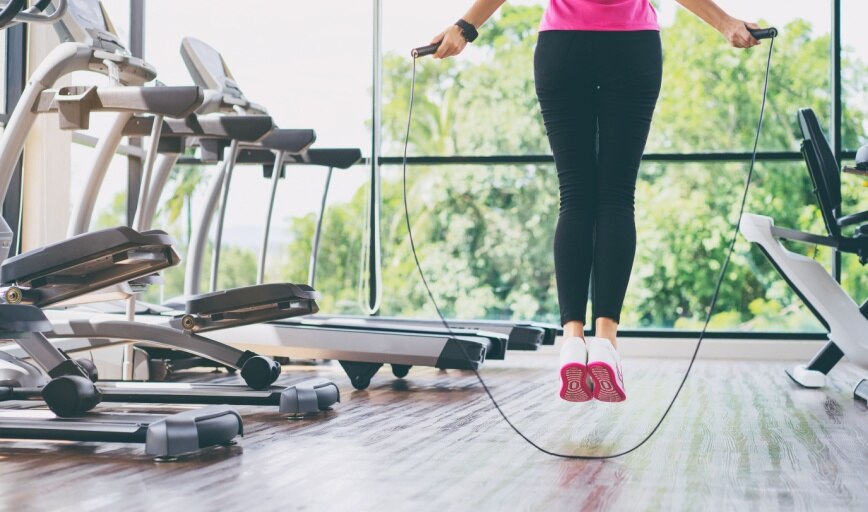Diabetes can significantly impact your body’s ability to create insulin. Over long periods, diabetes can affect your blood cells and destabilize the physiological balance in your body, often leading to hypertension.
Let’s understand how diabetes can lead to hypertension.
What you need to know:
- Understanding hypertension
- Analyzing the link between diabetes and hypertension
- Can diabetes cause hypertension?
- Do people with diabetes have higher blood pressure levels?
- Possible solutions for hypertension caused by diabetes
Understanding hypertension
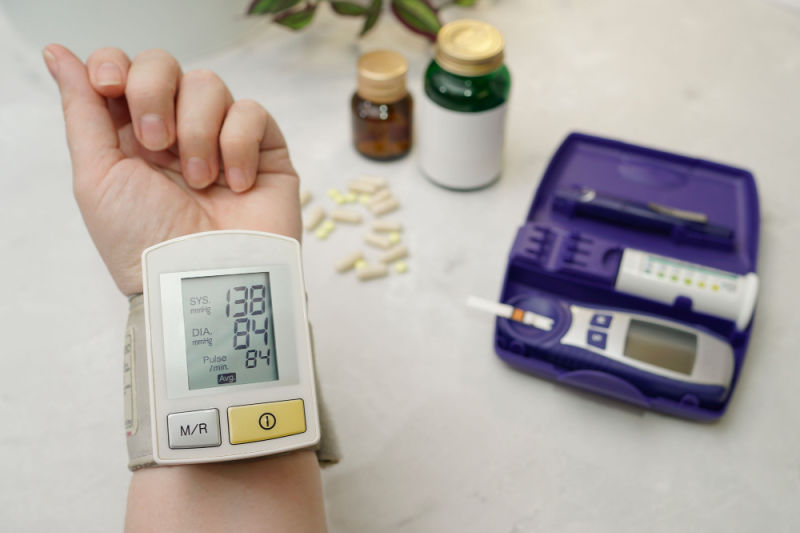

The relationship between high blood pressure and high blood sugar is complex. Hypertension is the gradual elevation of blood pressure levels, which can strain the heart and blood vessels over time. As a result, it leads to the narrowing of blood vessels. This, in turn, raises blood pressure levels and puts additional strain on the cardiovascular system. Additionally, when the blood pressure consistently exceeds this range, it indicates hypertension.
Hypertension is categorized into different stages based on the level of blood pressure readings. The stages help healthcare professionals determine the severity of the condition and guide appropriate treatment strategies.
Normal Blood Pressure:
- Systolic: Lesser than 120 millimeters Hg
- Diastolic: Lesser than 80 millimeters Hg
High Blood Pressure:
- Systolic: Between 130 and 139 millimeters Hg.
- Diastolic: Lesser than 80 millimeters Hg
Stage 1 Hypertension:
- Systolic: Between 130 and 139 millimeters Hg.
- Diastolic: Between 80 and 89 millimeters Hg
Stage 2 Hypertension:
- Systolic: More than 140 millimeters Hg.
- Diastolic: More than 90 millimeters Hg.
Hypertensive Crisis:
- Systolic Pressure: Higher than 180 mm Hg
- Diastolic Pressure: Higher than 120 mm Hg
Analyzing the link between diabetes and hypertension
Uncontrolled diabetes and hypertension can have severe implications for our health. Both diabetes and hypertension go hand in hand. High blood sugar levels can worsen hypertension, while elevated blood pressure can further damage blood vessels and impact diabetes management. Some symptoms of diabetes and hypertension include:
- Inflammation
- Obesity
- Excessive resistance toward insulin
- Unbearable stress
- Shortness of breath
Can diabetes cause hypertension?
A diabetic person lacks the regular insulin required to digest glucose effectively. Without insulin, your body cannot absorb glucose from food and use it as energy. This results in the accumulation of glucose in your bloodstream. As a result, high sugar in your blood can harm your organs badly.
Apart from diabetes, you can also experience hypertension because of other health problems and unhealthy habits:
- Genetics History: Evidence suggests that hypertension can increase if your family has it too! This phenomenon indicates a genetic predisposition to the condition.
- Unhealthy Diet: Poor dietary choices include consuming sodium and saturated fats. Sodium promotes fluid retention and narrows blood vessels.
- Sedentary Lifestyle: Lack of regular physical activity and leading a passive, inactive lifestyle can contribute to hypertension.
Do people with diabetes have higher blood pressure levels?
More than 100 million Indian citizens have had either type 2 diabetes or are at risk of developing diabetes soon enough. Almost 2 out of 3 diabetics have reported that they frequently experience symptoms of hypertension, and they take medications to lower and regulate blood pressure levels.
Possible solutions to hypertension caused by diabetes
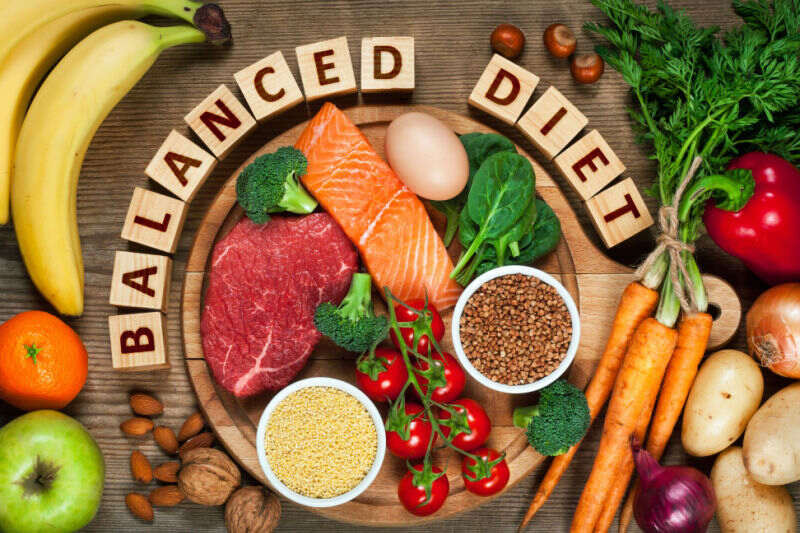

Altering your lifestyle and taking medications can go a long way in fighting diabetes and hypertension. Let’s take a look:
- Adopt a balanced diet: Focus on consuming veggies, fruits, and proteins. Avoid processed foods, saturated fats, and excessive sodium.
- Maintain a healthy weight: A healthy weight can help lower blood pressure. Even a slight weight reduction can have significant benefits.
- Angiotensin II receptor blockers (ARBs): ARBs cancel a hormone’s effects that narrow blood vessels, lowering blood pressure.
- Meditation: Studies have shown that practicing meditation regularly can positively impact blood pressure regulation. Meditation techniques, such as deep breathing and transcendental meditation, can activate the body’s relaxation response and promote cardiovascular health.
Individuals with diabetes and high blood pressure need to take steps to manage both conditions effectively.
Stay tuned to the Activ Living Community. Keep up to date with the latest health tips and trends through expert videos, podcasts, articles, and much more in nutrition, fitness, mindfulness, and lifestyle conditions like Asthma, Blood Pressure, Cholesterol, and Diabetes.
You may also be interested in the following blogs:
- 8 Natural Sources Of Beta Blockers To Treat Hypertension
- On World Diabetes Day, Know What Secondary Diabetes Is And Its Impacts?
Popular Searches
How to lower blood pressure | Fruits good for liver | Unhealthy foods | Ragi Benefits | Basal Metabolic Rate | Acupressure points for High Blood Pressure | Ayurvedic medicine for blood pressure | How to control cholesterol at home | Homeopathy for Asthma | Biological Age | Home remedies for TB | Natural beta blockers | Negative effects of internet | Types of walking | Blood pressure calculator | Blood sugar calculator | BMI Calculator












